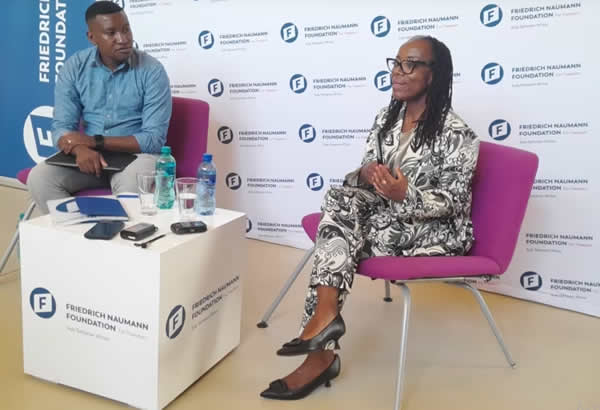
Zimbabwean author Tsitsi Dangarembga received the Africa Freedom Prize in Johannesburg on Thursday, which is awarded to individuals who “have shown remarkable courage and dedication to advancing the cause of freedom, democracy and human rights on the African continent.”
Tsitsi Dangarembga has long been one of Zimbabwe’s most highly regarded and beloved fiction writers — from her lauded first novel “Nervous Conditions” in 1988 to “This Mournable Body,” which was shortlisted for the Booker Prize in 2020.
Tinashe Mushakavanhu, a research fellow at the University of Oxford who specializes in Zimbabwean literature, said Dangarembga has a place in the modern canon.
“Her most important contribution is being the first Black, Zimbabwean woman writer to publish a novel in English. In that sense, she is a pioneer and a leading light, so much that her book, “Nervous Conditions,” is considered one of the best African books of the 20th century,” said Mushakavanhu.
That’s one of the reasons the Friedrich Naumann Foundation for Freedom, which promotes liberal politics and democracy around the world, is awarding Dangarembga their greatest honor today. She is also the recipient of the 2021 PEN International Award for Freedom of Expression.
Aside from her writing, Dangarembga has made headlines for her political activism. The 64-year-old was convicted by a Zimbabwean court last year of “inciting violence” after staging a peaceful protest with a friend during which the two women stood quietly on a roadside holding placards calling for political reform. That conviction was overturned earlier this year by a higher court.
So, would Dangarembga consider herself a political writer?
“I don’t conceive of myself as an activist writer. I conceive of myself as a person who has a story to tell, and my story has an intention. My intention is to tell stories in which Zimbabweans can see themselves reflected. And I think that is important for the well-being of the individual — to understand the complexities of the lives they are living and the challenges, and to possibly point to possible solutions. And I think when individuals are able to engage in that process, it leads to the health of the nation,” she said.
After independence in 1980, the former British colony was ruled by one man, Robert Mugabe, for almost four decades until he was overthrown in a bloodless coup in 2017. His successor from the same party, President Emmerson Mnangagwa, has failed to fix the country’s broken economy and has cracked down on dissent.
The political opposition called the last elections, held in August, a fraud, and the Southern African Development Community, which sent a mission to observe polls, expressed concerns over the fairness of the vote.
Among the previous winners of the Africa Freedom Prize are Nigerian novelist Chimamanda Ngozi Adichie.
Danai Mupotsa, a senior lecturer in African literature at Johannesburg’s Witwatersrand University, notes that female writers from the continent have been receiving more attention and accolades lately.
“There’s definitely a particular kind of moment for African writers and African women writers, I think, in particularly the last 10 years,” said Mupotsa.
Asked about this, Dangarembga said what it indicates is the publishing world has “’shifted to open up” and is publishing more work by African woman writers.
Source: voanews.com























